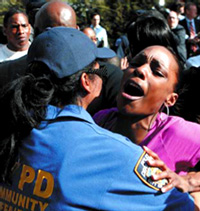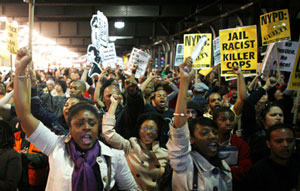New Yorkers vow to fight for justice for father killed in hail of 50 bullets
- In wake of acquitals, anger simmers New York (FCN, 05-06-2008)
- New York town mourns young Black police officer (FCN, 02-18-2008)
- Sean Bell: Tip of iceberg in NYC police murder culture (FCN, 04-16-2007)
NEW YORK (FinalCall.com) – The streets of New York City remain quiet after the acquital of NYPD detectives who fired 50 shots, killing unarmed Sean Bell and wounding two of his unarmed friends. But the Rev. Al Sharpton and other activists vow to shut the city down through acts of civil disobedience.
“We strategically know how to stop the city so it will stand and realize that you do not have the right to shoot down unarmed innocent civilians with no probable cause,” the Rev. Sharpton told a standing room only gathering at the National Action Network headquarters on West 135th Street the day after the verdict.

Rev. Sharpton declared the judge’s ruling was not an accidental miscarriage of justice, but “justice was aborted.” It was intentional deprivation of the rights of Mr. Bell and shooting victims Trent Benefield and Joseph Guzman, he said. The judge was supposed to look at the facts of the case, not decide the case based on whether some of those involved had scrapes with the law, he added.
People don’t lose their right to not be shot by police because they have a record, said Rev. Sharpton, who called the judge’s ruling illegal. The fact that the shooting victims filed civil cases also had nothing to do with the criminal prosecution, the civil rights leader continued. Rev. Sharpton said the city would not explode into violence, but strategic actions would be used to exert pressure for justice. He called for those at his organization’s headquarters and those listening to his national radio program to sign-up for protests and be ready to go to jail.
“On April 25, they killed Sean all over again. The justice system let me down,” said Nicole Paultre Bell, who lost her fiancée and father of two girls, speaking at the National Action Network headquarters.
“Our people are crying out for leadership,” the Rev. Herbert Daughtry, a longtime activist and pastor told The Final Call, before heading into an April 27 meeting and press conference with Marc Morial, CEO of the National Urban League and chairman of the Black Leadership Forum; Rev. Lennox Yearwood of the Washington, D.C.-based Hip Hop Caucus and others who joined Rev. Sharpton and the family of Mr. Bell in calling for the federal government to toughen laws against police brutality and increase oversight of police misconduct cases.
“The impact of this case could lead one to believe that police are above the law and that fairness is not on the side of the Black community,” Mr. Morial said, in a prepared statement.

In explaining why the leaders were gathering, Rev. Yearwood said, “Where there is no rule of law, people will organize to work for justice as a means to protect themselves out of necessity.”
Rep. John Conyers (D-Mich.) was reportedly headed to New York City at Final Call presstime to see the situation surrounding the Bell case firsthand. The congressman is expected to help to push the Justice Department to charge the three officers with violating the civil rights of the victims. The November 2006 incident occurred after a bachelor party for Mr. Bell, who died the day he was to get married. The detectives were in plainclothes.
Rap sheets eviscerated witness credibility, judge says
Justice Arthur Cooperman, 74, in explaining his not guilty verdict, said many of the prosecution’s witnesses, were simply unbelievable. “At times, the testimony of those witnesses just didn’t make sense,” said the judge, who is believed to be on the verge of retirement. The “inconsistent testimony, courtroom demeanor and rap sheets of the prosecution witnesses had left the effect of eviscerating their credibility.”
The judge said it was “necessary to consider the mindset of each defendant Michael Oliver, Marc Cooper and Gescard Isnora, at the time and place of the occurrence.”
“The burden of proof was on the people to prove each defendant guilty of the crimes of which he was charged, beyond a reasonable doubt,” Justice Cooperman said.
The prosecution attempted to show the shooting was the act of a frightened group of disorganized police officers–who were out to arrest prostitutes–but turned their attention to Mr. Bell and his friends believing they had a gun.
“Carelessness and incompetence are not standards to be applied here, unless the conduct rises to the level of criminal acts,” the judge said.
All three detectives waived their right to a jury trial in January after attempts to gain a change of venue failed. Two detectives acquitted in the case were Black, including the detective who fired the first shot. Det. Michael Oliver, who fired 31 shots, is White. He fired the most shots. Defense attorneys had argued jurors in Queens were likely to be biased due to intense media coverage of the case.
Rev. Sharpton argued it was ludicrous to question why victims might be confused, with bullets flying and enduring gunshot wounds, about whether they were shot in a car or outside a car. Maybe they don’t remember because they were running for their lives, he said.
Independent prosecutor’s office needed?
De Lacy Davis, executive director of Black Cops Against Police Brutality told The Final Call he was “not surprised” by the judge’s decision. “I knew what the outcome would be the moment they asked for a judge. They knew they would be judged within the standards of the dominant culture of the criminal justice system,” Mr. Davis said.
“Police officers are trained to create what is called a ‘affirmative defense’–to create reasonable doubt–that they were in fear for their lives,” he said. How does a judge know the mindset of an officer? Mr. Davis asked.
At their grand jury appearance, the detectives said they fired on Mr. Bell’s car after it grazed an officer and they believed a detective was fired upon, according to published reports.
One leader in America with insight into the mindset of police officers and the judge is the Honorable Minister Louis Farrakhan. “Police authorities are trained to kill, as well as to protect. But, where Black people are concerned, police legitimize their mob attacks under the name of ‘back up,’ ” Min. Farrakhan explained last November during a lecture titled “Black Youth In Peril: Part 1.”
“Police back up is often no different than the lynch mobs 100 years ago,” he said. “The killing of our people, shooting them with many bullets when one would have done the job. And then, that deliberative body which is to discuss the brutal murder of our people by looking into the facts, comes away calling it justifiable homicide,” Min. Farrakhan concluded.
The point Min. Farrakhan continues to raise explains why our people have no faith in the criminal justice system, a system in which Blacks receive no justice, said Kevin Muhammad, student minister at Muhammad Mosque No. 7. “Min. Farrakhan continues to teach that when Black people go to the table of justice, there is no even playing field,” Mr. Muhammad told The Final Call. “That is why he has called for us to form our own Ministry of Defense, which becomes our own justice system.”
“Indeed police officers seem to know that they can kill certain people with impunity,” stated former Georgia Congresswoman Cynthia McKinney, the Green Party candidate for president. “While we might be outraged at the Sean Bell decision itself, it comes directly from the flawed jurisprudence that gave us the Dred Scott Decision in 1857 and Plessey v. Ferguson in 1896,” she added.
Rev. Yearwood said the verdict “exemplifies the inadequacy of the shortcomings of local courts, criminal justice systems to adjudicate police shootings, especially those that result in death. We have not been witnesses to fair and impartial administration of justice.”
Prof. Katheryn Russell Brown, director of the Center for the Study of Race Relations at the University of Florida and author “Protecting Our Own: Race, Crime, and the African American,” said, “These cases–Bell (Amadou) Diallo–explain the African American community’s reaction to the O.J. Simpson case and its general dillusionment with the criminal justice system.”
There was also a call from leaders and activists, such as state Sen. Eric Adams, civil rights attorney Norman Siegel and members of 100 Blacks In Law Enforcement Who Care, for appointment of a permanent special prosecutor to handle cases of death or serious injury caused by police officers. Gov. David Paterson was asked to create the office.
“Something needs to be done right now,” said Marque Claxton, a spokesman for 100 Blacks In Law Enforcement. “What we need is progressive, revolutionary action that provides protection to all of the people in the state and in the city,” Mr. Claxton added.
The three officers remain off active duty but face departmental charges. Police Commissioner Raymond Kelly told reporters no action would be taken because the Justice Department has asked the NYPD to hold off until a federal investigation is completed.












